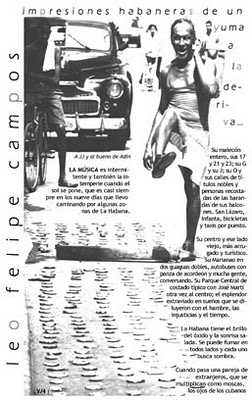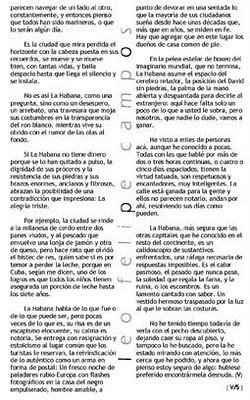Havana Impressions of a Yuma Adrift
Leo Felipe Campos
To JJ and Adin
MUSIC is intermittent and also intemperate when the sun sets, almost always in the nine days I have been walking all over Havana.
Across its entire waterfront, its 17th, 21st and 23rd; its G and its J; if O and its streets with noble names and people hanging over the railings of their balconies. San Lázaro, Infanta, bicycles and taxis at hand.
Its center and its old side, more wrinkled and touristy. Its Marianao in two double buses, buses with an accordion belly and a lot of people, talking, its typical Central Park with Jose Mari again in the center; the splendor lost in dreams diluted by hunger, injustice and time.
Havana has the brightness of rust and the salty smile. You can smoke anywhere and everyone looks for the shade.
When you pass a couple of foreigners, who are multiplying like flies, the eyes of the Cubans seem to sail back and forth, constantly, and then I think they have all been mariners, or will be someday.
It is the city with its gaze lost on the horizon and its head set in its memories, it moves and moves well, with so many lives, and dances slowly until silence comes and it settles.
It’s not like this in Havana, like a question, but not a desperation, an outburst, a prank that wets its customs in the transparency of white rum, while living its forgetfulness with the rumor of the waves in the background.
If Havana has no money it is because it has taken the hard way, the dignity of its heroes and the resistance of its rocks and enormous arms, ancient and sinewy, embracing the possibility of a striking contradiction: Sad happiness.
For example, the city yields to the Milanese of pork between two widowed slices of bread, and fish wrapped in a slice of ham and another of cheese, but long ago it forgot beef, who knows if it is out of fear of losing milk, because in Cuba, I am told, one of the achievements is that every child up to age seven is assured a serving of milk.
Havana talks of what was and what could be, but rarely of what is, its laughter is eloquent escapism, its composure remarkable. It comes with resignation and stoicism to a common place reserved by the tourists, the re-vindication of the authentic as a weapon in the form of a postcard: A cool-night of red-European restaurants with photographic flashes in the black man’s house, a kind man, on the point of devouring in one sitting what the majority of its citizens have dreamed for some decades, rather than years, is measured in faith. It must be said that in this place the owners of the house eat standing.
In the champion boxing match that in the world’s imagination never ends, Havana assumes the place of David without stones, palm open and unthreatening to tell the foreigner: here we need just a little of what you have plenty to spare, but we, let no one doubt it, we will win.
I have seen thousands of people here, although I know few. All I spoke with for more than two or three continuous hours, or four or five days time, have the tattooed virtue, are respectful and charming, very intelligent. The street fills with people and they don’t seem to notice it, walking there, resolving their days as best they can.
Havana, safer than the other capitals I’ve known on the rest of the continent, is a kaleidoscope of confronted faces, a necessary burst of impossible responses. The heat is staggering, a past that never goes away, the loneliness that gives fame, and the ruins, the debris. It is a tastefully sung lament. A beautiful dress pierced by the light that overwhelms the seams.
I still haven’t had time to see its bare chest, leaving its clothes on the floor, and I still haven’t looked, but I have been watching closely, as closely as I could, and now I think I am sure of one thing: I would have preferred to find it naked.
September 29, 2010


